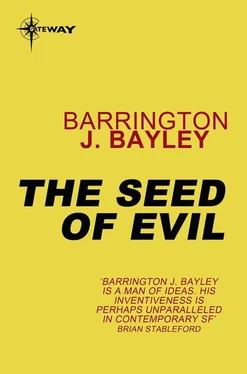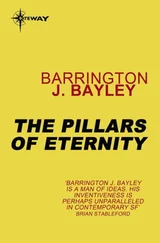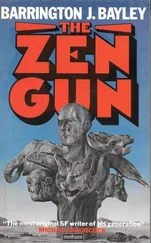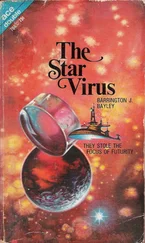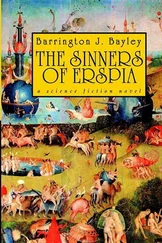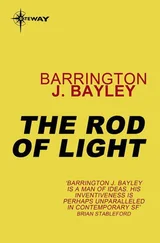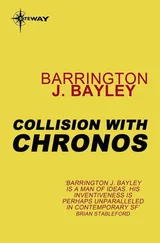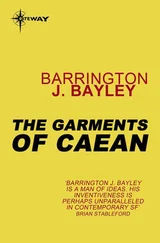Barrington Bayley - The Seed of Evil
Здесь есть возможность читать онлайн «Barrington Bayley - The Seed of Evil» весь текст электронной книги совершенно бесплатно (целиком полную версию без сокращений). В некоторых случаях можно слушать аудио, скачать через торрент в формате fb2 и присутствует краткое содержание. Город: London, Год выпуска: 2012, ISBN: 2012, Издательство: Gateway, Жанр: Фантастика и фэнтези, на английском языке. Описание произведения, (предисловие) а так же отзывы посетителей доступны на портале библиотеки ЛибКат.
- Название:The Seed of Evil
- Автор:
- Издательство:Gateway
- Жанр:
- Год:2012
- Город:London
- ISBN:978-0-575-10220-0
- Рейтинг книги:4 / 5. Голосов: 1
-
Избранное:Добавить в избранное
- Отзывы:
-
Ваша оценка:
- 80
- 1
- 2
- 3
- 4
- 5
The Seed of Evil: краткое содержание, описание и аннотация
Предлагаем к чтению аннотацию, описание, краткое содержание или предисловие (зависит от того, что написал сам автор книги «The Seed of Evil»). Если вы не нашли необходимую информацию о книге — напишите в комментариях, мы постараемся отыскать её.
, here is a second collection of endlessly inventive stories by Barrington J. Bayley; dark fables resounding with sombre undertones—love used as a weapon, God assassinated by the ingenuity of man, the secret of death revealed, the inexplicable explained! Tales which will be pondered on, and remembered.
The Seed of Evil — читать онлайн бесплатно полную книгу (весь текст) целиком
Ниже представлен текст книги, разбитый по страницам. Система сохранения места последней прочитанной страницы, позволяет с удобством читать онлайн бесплатно книгу «The Seed of Evil», без необходимости каждый раз заново искать на чём Вы остановились. Поставьте закладку, и сможете в любой момент перейти на страницу, на которой закончили чтение.
Интервал:
Закладка:
I helped Marcus to the changing room and sat him down. He begged for wine. Though apprehensive of what its effect might be on top of so many drugs, I took a flask from the cupboard, uncorked it and poured him a goblet. He gulped it greedily, at which a little colour came to his cheeks.
“I shall be all right,” he said in answer to my solicitations. “Just give me a minute or so to recover.”
I stood by while he slumped in the chair, breathing heavily. At length I could forbear no longer. What, I enquired, had been the outcome of the experiment? Had it been successful? He groaned, and in sombre tones told me that it had; indeed (his voice fell to a mutter) the whole secret of death had been revealed to him. “Do not ask me to reveal this secret,” he said. “Better not to know.”
Astonished, I reminded him of the rule of our order forbidding any member to withhold from his brothers anything he has learned as a result of his work in the Temple, and again I eagerly pressed him to relate his new knowledge. He nodded resignedly and asked for more wine. Then, uttering a deep sigh, he related what is essentially the following.
Death (he said) is reversal. Reversal of consciousness, and reversal of time.
What do I mean by this? I will take consciousness first, for that is the first thing to be reversed. As we are now, our consciousness is within our bodies. I perceive you through my eyes, and within my brain I derive, through my senses, a picture of the outside world. Of myself I have no direct perception. I know myself only indirectly, through my relations with others, or through beholding myself in a mirror.
After death all this changes. Consciousness remains; but it is consciousness external to one’s body. It becomes an objective consciousness, similar to experiences of ecstasy we have had accounts of, where one sees oneself from outside. One watches while one’s body is laid out. One is present when it is placed on a bier and, accompanied by one’s friends and relatives, carried to the grave.
Then one seems to be present in the grave, watching the cast-off body decay for several months. From this there is no escape, for one’s consciousness is always where one’s body is. This, you might think, is a harrowing experience. But wait.
The reason why one becomes conscious of one’s dead body is that consciousness has momentum and, for a spell, coasts forward through time. But after a while the second reversal takes place. Time reverses.
(Emptying his goblet, Marcus reached for the flask, ignoring my anxious glance in that direction.) Time reverses. Do you understand me? Time runs backwards. Death truly is the end of life, but only in the sense that a road ends in a particular place. After that one turns round and retraces one’s steps. One finds oneself watching as one’s corpse slowly mends, is taken up from the ground, is carried home, and comes to life. So one’s life resumes, from death to birth. Reversed time. Reversed consciousness.
Eventually birth must come again. The shock of this is like the shock of death, and indeed it is, for this reversed life, the same as death. And again one’s consciousness coasts past it, but made internal now, living as a shrinking foetus until time again reverses itself and the foetus expands again, and one is born, a new babe, seeing the world through the senses as before.
This, then, Clinias, is the manner of our lives. The soul oscillates eternally between the poles of birth and death, though we know it not, and not one whit of what has happened can be changed. Therein, in our ignorance, lies our happiness for the present. But wait. You will not be happy. Wait until you stand outside yourself and must see yourself….
Marcus’s voice trailed off. “So the doctrine of an eternally repeating life comes closest to the truth,” I ventured.
“Yes. We have lived this life many, many times before.”
“But why so gloomy, Marcus? It is immortality after a fashion.”
Marcus looked up at me with a startled look on his face. “Have you not understood, Clinias? Do you not see? This is the worst of all possibilities! Each of us is doomed to see himself as he appears to the external world, and in that stance to live again through every detail of his existence! Every unworthy act, every self-deception, every last piece of shame we hide even from ourselves—all is presented to our gaze, and for a lifetime! How can one endure it? There is no one who lives with such dignity that this could be bearable!”
Slowly the horror of Marcus’s revelation began to dawn on me. Unsteadily he rose to his feet and placed his hand on my shoulder. For long moments the silence of the Temple seemed to descend on us, while I pondered on what I had heard and stood there with my friend.
“That nothing can be changed is the worst aspect of it,” Marcus said wearily. “How one longs and aches to be able to change what one sees!”
“We are in a trap,” I observed.
He nodded. “Normally the traumas of birth and death wipe memory clean. For our temerity the gods have allowed me to glimpse the truth, and to remember it. That is our reward, and our punishment. But I can speak no more tonight. Let us go home. We have done enough.”
Suddenly Marcus was violently sick. I cleaned him up, conducted him to his house, and saw to it that he was put to bed, leaving him only after he had fallen soundly asleep.
Although the secret of death has been imparted to the full membership of the Temple, not all have understood its import. Several members, driven by curiosity, have repeated Marcus’s experiment, with results that more or less confirm his findings, but to most it is interesting merely; they do not grasp its terror. To live a life which, because lacking external awareness of itself, is contemptible and mean, and then to be given that awareness which alone could have improved it—and be condemned at the same time to do no more than watch the wretched and loathsome spectacle! The gods do indeed chuckle when they look down on the human condition.
A change of outlook has been forced on we senior members of the Arcanum who do understand the meaning of Marcus’s discovery. Suicide, which once seemed an honourable escape from undignified circumstance, is now realised to be no escape at all. And yet from this trap of life there should be, if the world is just, some escape.
Marcus has sickened, but fears to die. We all of us fear to die, knowing what awaits us. Men, who take refuge in never seeing themselves as they really are, invariably will shun such a vision.
Our work now is in how to end the eternal oscillation, whether to gain oblivion or a new life does not matter. But how may it be done? On that we have not a single idea. The gods may know. The gods, whom we have spurned as confusers and defilers of the minds of men, perhaps in the end we must turn to the gods.
Farewell, Dear Brother
Strangers are a nuisance. Few people have anything new to say to a man once he’s settled down in life.
But occasionally someone turns up whose chance words stir up vivid memories, and set me thinking again.
A man like that turned up at a small party my wife and I gave. He was small, agile, about forty, and he may have been intoxicated. With his type, it’s hard to tell. Some friends of ours had brought him along, and he clearly didn’t know whose house it was he had come to.
He was one of those people who can’t stop talking. I steer clear of talkers usually, but he managed to corner me and so I let him chatter volubly on for a few minutes.
Then I discovered that this one was different, from my point of view. He had just returned from an expedition to Celenthenis, the Planet of Cold.
I became more alive to him. “Oh, yes,” I said, “I had heard there was a second expedition. What did you think of the place?”
Читать дальшеИнтервал:
Закладка:
Похожие книги на «The Seed of Evil»
Представляем Вашему вниманию похожие книги на «The Seed of Evil» списком для выбора. Мы отобрали схожую по названию и смыслу литературу в надежде предоставить читателям больше вариантов отыскать новые, интересные, ещё непрочитанные произведения.
Обсуждение, отзывы о книге «The Seed of Evil» и просто собственные мнения читателей. Оставьте ваши комментарии, напишите, что Вы думаете о произведении, его смысле или главных героях. Укажите что конкретно понравилось, а что нет, и почему Вы так считаете.
